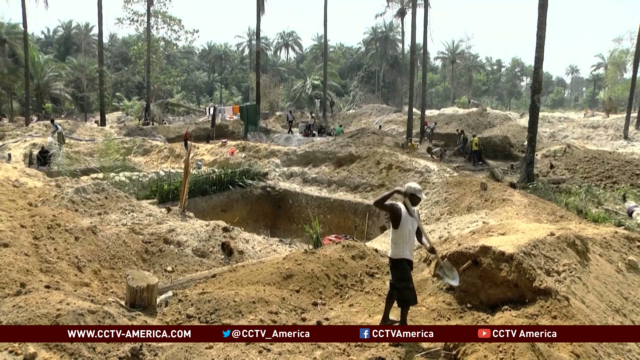A year ago, West Africa’s mining industry was seen as a potential boost to the region’s economy. But with the ebola outbreak, the industry has seen setbacks and even pullouts by investors. CCTV’s Stephanie Fried reported this story from Forecariah diamond mine in Guinea.

Southern Guinea has been referred to as the El Dorado of iron-ore, because it has the world’s largest untapped iron-ore deposits.
This attributed to global mining powerhouses drawing up hefty contracts. The most notable agreement was a $20 billion venture, Africa’s largest ever proposed mining deal.
But when Ebola struck, it scared away foreign investors and brought the the industry to a grinding halt as corporate representatives and contractors fled and employees frightened of contracting the virus stopped showing up for work.
A year later, an industry that supports 25 percent of Guinea’s economy is in limbo.
Mining giants Rio Tinto, Vale and BHP are staying the course here with their plans for expansion. However, despite the continued spread of Ebola, reportedly none of those giants has a plan for recovery.
The recovery plans for Guinea’s bauxite, gold or diamond mining sectors are nonexistent.
Before the Ebola outbreak,Forecariah diamond mine bustled with more than a thousand workers. Since, the labor force numbers have dwindled to a 150, and the ripple effect is slimming that number.
“My boss who supports me doesn’t have money,” Shekku Sumanar said. “So I have to lay off my workers because since Ebola started, investors have been pulling out. I’ve had to lay a lot of them off.”
Production is down by 65 percent and there is no funding for the type of heavy machinery that enables deep mining, to get to where the diamonds are. This has left the bare bones work staff limited to skimming the surface.
Corporate investors either are no longer in Guinea or are maintaining low profiles, were unavailable to comment.
Trade to West African countries was hit hardest by Ebola is reportedly down by 10 percent.
With the numbers of Ebola victims continuing to rise, officials are worried regional development could be set back by 10 years.
 CGTN America
CGTN America

